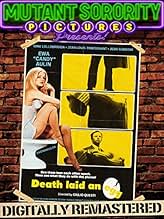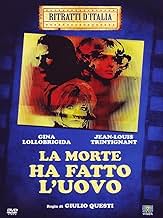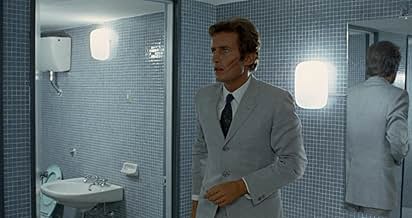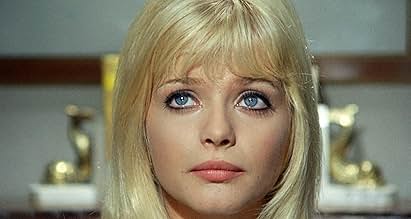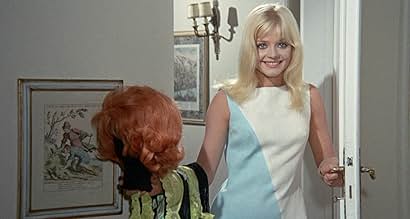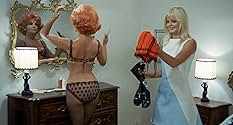IMDb-BEWERTUNG
5,8/10
1917
IHRE BEWERTUNG
Füge eine Handlung in deiner Sprache hinzuThe depraved manager of a high-tech poultry factory is pulled into a love triangle with his domineering wife and her sexually-liberated cousin, leading to double-crosses and murder.The depraved manager of a high-tech poultry factory is pulled into a love triangle with his domineering wife and her sexually-liberated cousin, leading to double-crosses and murder.The depraved manager of a high-tech poultry factory is pulled into a love triangle with his domineering wife and her sexually-liberated cousin, leading to double-crosses and murder.
- Regie
- Drehbuch
- Hauptbesetzung
Jean-Louis Trintignant
- Marco
- (as Jean Louis Trintignant)
Empfohlene Bewertungen
Sort of an absurdist giallo, DEATH LAID AN EGG is about wealthy chicken farm owners, Anna (Gina Lollobrigida), her husband Marco (Jean Louis Trintignant), and their secretary, Gabrielle (Ewa Aulin). Life on the farm is blissful, in spite of Marco and Gabrielle's affair. Of course, neither of the women know that Marco is a serial killer.
Indeed, this is a strange, trippy film, bordering on the psychedelic. The "experimental" music soundtrack -which sounds a lot like someone slamming their face into a piano, while torturing a hyena with a violin- is reminiscent of that heard in A QUIET PLACE IN THE COUNTRY.
A perfect example of EGG's lunatic charm comes during a party, where the participants pile all of the furniture into the middle of the living room, and take turns entering another room in order to be "totally honest". This, having something to do with human / chicken behavior (!).
Anyone expecting a straightforward, logical story line might find this to be an excruciating experience. Aside from all of the 60's flash, it suffers from extreme tedium.
However, poultry lovers will rejoice aloud, as our feathered friends are featured quite prominently throughout! Beware of the hideous, pulsating, wingless, headless, mutant, monster chickens! Their gushy deaths will haunt you forever!...
Indeed, this is a strange, trippy film, bordering on the psychedelic. The "experimental" music soundtrack -which sounds a lot like someone slamming their face into a piano, while torturing a hyena with a violin- is reminiscent of that heard in A QUIET PLACE IN THE COUNTRY.
A perfect example of EGG's lunatic charm comes during a party, where the participants pile all of the furniture into the middle of the living room, and take turns entering another room in order to be "totally honest". This, having something to do with human / chicken behavior (!).
Anyone expecting a straightforward, logical story line might find this to be an excruciating experience. Aside from all of the 60's flash, it suffers from extreme tedium.
However, poultry lovers will rejoice aloud, as our feathered friends are featured quite prominently throughout! Beware of the hideous, pulsating, wingless, headless, mutant, monster chickens! Their gushy deaths will haunt you forever!...
An avant-garde kind of giallo (more like a meta-reflection on the genre, really) that it's all over the place. Like a strange mix of Buñuel and Antonioni cinema with a documentary on acid of the poor conditions of a poultry factory, the plot was a little too convoluted to really keep my attention and I think the film tries too hard to be something different, without really achieving much. It's still an important title in this subgenre, but not for everyone.
Let's be honest, the very title and premise are so wildly curious as to almost demand viewership; it's billed as a thriller, but expectations just go right out the window. The opening minutes don't do much to help form a concrete notion: between Bruno Maderna's excellent, vibrant score, unnerving in its emphatic discordance, and the wealth of imagery to greet us in short order, it's hard to know just what it is we've committed to watching - yet also hard not to be invested in the bizarrerie. As the narrative starts to take shape a more clear notion forms of what 'Death laid an egg' is about. Though in the broad strokes it may fit squarely into a classic Italian genre, and there are distinct difficulties with the feature as it presents, it's still suitably intriguing and engaging to be worth exploring on its own merits.
About those problems, though. As much as the movie works to catch our attention at the very start, it feels a little bit as though it's compensating for plot development that's meager and unbothered as the story first picks up. And that continues to hold true - a persistent swing of the pendulum between arresting imagery and audio, and mundane and gradual advancement of the story. Ultimately I think the back and forth between one end of the spectrum and another means we get roughly equal amounts of both - but that doesn't mean the picture is perfectly balanced. Because by the same token, Franco Arcalli's sharp, brisk editing helps to reinforce the near phantasmagoric audiovisual overload, maintain the overall pace, and build tension and suspense. Yet much of the sequencing comes across as disordered, furthering the sense of imbalance, and even incoherence, as a variety of story ideas are introduced that seem peculiarly disparate. For that matter, I believe the narrative is complete, but it struggles to even feel cohesive: some small included scenes only heighten the confusion, and maybe I just blinked at the exact wrong time, but there's also a lack of clarity in some regards.
What it comes down to is that 'Death laid an egg' tries very hard to give us a veritable cacophony of light and sound, and it succeeds in that aim. The trouble is that this choice serves to chop the plot into a deeply fragmented construction - yet without that fundamental flair, at its roots the plot is actually quite ordinary and unremarkable. Some aspects of it frankly feel altogether contrived. What we have is an issue of overwhelming style taking precedence over merely serviceable substance, and there's no great victory possible in the midst of that dichotomy. It's not that this is outright bad - not at all! I do admire the endeavor, and the gumption to fashion a story in this way. There are a few noteworthy names in the cast, and I think everyone turns in fine, nuanced displays of acting. The production design, art direction, and all manner of contributions from behind the scenes all look great generally, even when some elements fail to wholly comport. Giulio Questi demonstrates capable skills as director, and there are some splendid bits and pieces of ideas in the screenplay he wrote with Franco Arcalli.
Somehow, though, when all is said and done, much of the value gets subsumed by the kaleidoscopic film-making and storytelling. Unorthodox craft works well for many titles, yet the method must not overshadow the content as it does here. I do like 'Death laid an egg' more than I don't, but I wish I liked it more - and just as it was curiosity that drew me in at the start, having watched, curiosity may remain the best reason to check it out. It's duly recommendable for a number of reasons - fans of giallo, or the cast; appreciation of atypical movie-making or narratives, or of brilliant, memorable music. By whatever means one discovers 'Death laid an egg,' however, potential viewers should just keep in mind that one way or another it's not quite the viewing experience it inherently submits itself to be.
About those problems, though. As much as the movie works to catch our attention at the very start, it feels a little bit as though it's compensating for plot development that's meager and unbothered as the story first picks up. And that continues to hold true - a persistent swing of the pendulum between arresting imagery and audio, and mundane and gradual advancement of the story. Ultimately I think the back and forth between one end of the spectrum and another means we get roughly equal amounts of both - but that doesn't mean the picture is perfectly balanced. Because by the same token, Franco Arcalli's sharp, brisk editing helps to reinforce the near phantasmagoric audiovisual overload, maintain the overall pace, and build tension and suspense. Yet much of the sequencing comes across as disordered, furthering the sense of imbalance, and even incoherence, as a variety of story ideas are introduced that seem peculiarly disparate. For that matter, I believe the narrative is complete, but it struggles to even feel cohesive: some small included scenes only heighten the confusion, and maybe I just blinked at the exact wrong time, but there's also a lack of clarity in some regards.
What it comes down to is that 'Death laid an egg' tries very hard to give us a veritable cacophony of light and sound, and it succeeds in that aim. The trouble is that this choice serves to chop the plot into a deeply fragmented construction - yet without that fundamental flair, at its roots the plot is actually quite ordinary and unremarkable. Some aspects of it frankly feel altogether contrived. What we have is an issue of overwhelming style taking precedence over merely serviceable substance, and there's no great victory possible in the midst of that dichotomy. It's not that this is outright bad - not at all! I do admire the endeavor, and the gumption to fashion a story in this way. There are a few noteworthy names in the cast, and I think everyone turns in fine, nuanced displays of acting. The production design, art direction, and all manner of contributions from behind the scenes all look great generally, even when some elements fail to wholly comport. Giulio Questi demonstrates capable skills as director, and there are some splendid bits and pieces of ideas in the screenplay he wrote with Franco Arcalli.
Somehow, though, when all is said and done, much of the value gets subsumed by the kaleidoscopic film-making and storytelling. Unorthodox craft works well for many titles, yet the method must not overshadow the content as it does here. I do like 'Death laid an egg' more than I don't, but I wish I liked it more - and just as it was curiosity that drew me in at the start, having watched, curiosity may remain the best reason to check it out. It's duly recommendable for a number of reasons - fans of giallo, or the cast; appreciation of atypical movie-making or narratives, or of brilliant, memorable music. By whatever means one discovers 'Death laid an egg,' however, potential viewers should just keep in mind that one way or another it's not quite the viewing experience it inherently submits itself to be.
Giulio Questi's early giallo is very different from the genre, but it can be called giallo since it has a mystery audience has no idea about until the very end. But the mystery doesn't involve the identity of the possible murderer but the various and altering relations between the characters. Marco, Anna and Gabrielle live together and work together, in a huge chicken farm / factory owned by Anna. Soon it is clear all three, plus their friends, have another things in their minds; they act what they don't say and vice versa. This gives the director Questi a great opportunity to handle topics of greed and money that easily blind.
The way how Questi handles his theme is very satiric, thus making the film close with Mario Bava's Reazione a catena / Bay of Blood 3 years later. Both films have serious theme about man's ability to turn violent in his search for monetary benefit and freedom and both films discuss this satirically, with maximal effect since comedy is often at its best when the subject stays serious and universally important. As a pure giallo mystery, the film is also quite rich since the audience has no idea what is going on until the very end when it is revealed. Questi uses very interesting editing technique that makes many of the scenes "broken", using flashbacks, dreamy/nightmarish moods and so on. This forces us to dive deeper inside the characters and their varying points of views.
The film has also an interesting topic about man's subconscious and instincts. Main character Marco is considered "morally corrupt" due to his unusual sexual preferences. But at the same time Questi shows how much there is inside human brain, needs, wills, desires, we don't necessarily want to talk about in fear of unacceptance or being classed as "sick." We are not as civilized, as perfect, as the moral codes of society try to suggest when they go after "the morally sick" Marco. There's also a very harrowing and unforgettably absurd scene at the experiment lab of the factory. The doctors have created a manipulated type of chicken that would be commercially extremely profitable to the factory while at the same time the manipulated monsters are a plentiful spitting at nature's face. Marco is against this, against the others around him while he has been named "morally wrong" and bad. Questi had important things and questions in mind and also the ability to turn them into a film.
Real themes in a giallo thriller are quite rare and Questi has done it very well. This is among the earliest but also among the very best of the giallo.
The way how Questi handles his theme is very satiric, thus making the film close with Mario Bava's Reazione a catena / Bay of Blood 3 years later. Both films have serious theme about man's ability to turn violent in his search for monetary benefit and freedom and both films discuss this satirically, with maximal effect since comedy is often at its best when the subject stays serious and universally important. As a pure giallo mystery, the film is also quite rich since the audience has no idea what is going on until the very end when it is revealed. Questi uses very interesting editing technique that makes many of the scenes "broken", using flashbacks, dreamy/nightmarish moods and so on. This forces us to dive deeper inside the characters and their varying points of views.
The film has also an interesting topic about man's subconscious and instincts. Main character Marco is considered "morally corrupt" due to his unusual sexual preferences. But at the same time Questi shows how much there is inside human brain, needs, wills, desires, we don't necessarily want to talk about in fear of unacceptance or being classed as "sick." We are not as civilized, as perfect, as the moral codes of society try to suggest when they go after "the morally sick" Marco. There's also a very harrowing and unforgettably absurd scene at the experiment lab of the factory. The doctors have created a manipulated type of chicken that would be commercially extremely profitable to the factory while at the same time the manipulated monsters are a plentiful spitting at nature's face. Marco is against this, against the others around him while he has been named "morally wrong" and bad. Questi had important things and questions in mind and also the ability to turn them into a film.
Real themes in a giallo thriller are quite rare and Questi has done it very well. This is among the earliest but also among the very best of the giallo.
I like how experimental some of these early gialli are. This is another movie about kind of spoiled rich people playing games with each other and getting into sordid trouble. Murder is involved, but not in the way you'd think after seeing the first half of the film, and I think that's one of the clever things about it. The story is more engaging than some, and, for once, actually more involving than set pieces, of which they are few (no prolonged stalking/murder sequences or anything like that).
Also, the movie is really funny at times, and I think it's absolutely intentional. The scene with the PR guy and all his "chicken poses" is priceless and like something you might find in a Monty Python sketch. I think there's some nice satire here of the rich industrial class, and a political subtext about automation and workers' rights. You see this sort of thing in vintage Italian genre films sometimes, and it's nice to see that sometimes, a thriller isn't just a thriller, if you know what I mean.
Finally, this is a slightly experimental film, with lots of fast edits and artistic scene transitions that often tell you things that aren't explicit in dialogue or scene itself. Also, the music -- I think it's great, in all its clanging and banging around and discordance, but it definitely won't be to everyon'e staste. A tip from my partner: "if you imagine a chicken playing the music, it becomes a thousand times better".
Also, the movie is really funny at times, and I think it's absolutely intentional. The scene with the PR guy and all his "chicken poses" is priceless and like something you might find in a Monty Python sketch. I think there's some nice satire here of the rich industrial class, and a political subtext about automation and workers' rights. You see this sort of thing in vintage Italian genre films sometimes, and it's nice to see that sometimes, a thriller isn't just a thriller, if you know what I mean.
Finally, this is a slightly experimental film, with lots of fast edits and artistic scene transitions that often tell you things that aren't explicit in dialogue or scene itself. Also, the music -- I think it's great, in all its clanging and banging around and discordance, but it definitely won't be to everyon'e staste. A tip from my partner: "if you imagine a chicken playing the music, it becomes a thousand times better".
Wusstest du schon
- WissenswertesThis is the second pairing of Jean-Louis Trintignant and Ewa Aulin in a film in the giallo vane, the other being "I Am What I Am" the previous year.
- PatzerIn the first slasher scene, the knife blade doesn't show any blood till after 7 slashes.
- VerbindungenFeatured in Ultimate Poliziotteschi Trailer Shoot-Out (2017)
Top-Auswahl
Melde dich zum Bewerten an und greife auf die Watchlist für personalisierte Empfehlungen zu.
Details
Zu dieser Seite beitragen
Bearbeitung vorschlagen oder fehlenden Inhalt hinzufügen



